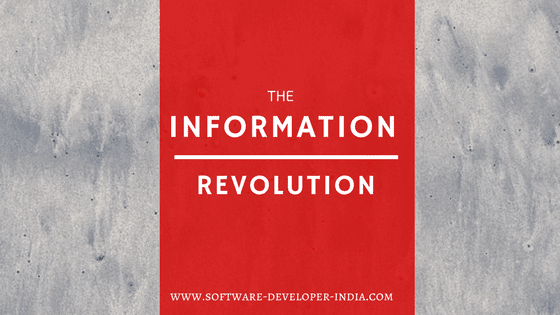The Information Revolution

The information revolution is happening in a big way, at a magnitude by which nobody could predict. The revolution that started decades ago is still going strong and nobody can escape the effects it has on business. Dramatic reductions in the cost of acquiring and disseminating information are changing the way companies convey it to their customers. Since every company in the IT world has accepted information revolution, nobody can resist it or dispute it anymore. Though it initially started off with a small degree of resistance from people who detested change, they were quickly won over.
Today, information revolution is not just computers and internet, it is big fish that was conceived broadly with the help of a wide spectrum of a largely convergent and connected technologies. These technologies can now not only bring information instantly, but they can make devices communicate with one another; which as you already know has been termed as Internet Of Things.
Here are three simple ways in which information revolution is changing the way we do business
- There has been changes in the rules of competition
- Increase in competitive advantage as companies have access to new ways through which they can out perform competition
- Information revolution has a spawned a whole new way of doing business with the help existing resources
Until sometime ago we were all living in the broadcast era where people used to read newspapers and magazines, heard news and programs from radio, see news on television and gained information from them. This went on for some centuries until we came into the networked media. This strategically and fundamentally changed the way information reached people. Some people still nostalgically remember the way they used to listen to their favorite programs and news shows. They did this at a particular time every night and it became a daily habit. And then what happened? As television channels proliferated and more publishing brands came in, attention got fragmented and there arose a huge number of entities that began to vie for attention. Now everyone wants a piece of the “pie” and when Internet grew in popularly, there grew no bounds for it. People began to make their own content, so they no longer relied on televisions, and newspapers have been pushed into oblivion.
Internet technologies have been dismantling and reworking on the structures of information distribution. Content creators began to find channels through which they can pass on information; the channels of distribution are no longer limited. Earlier, power was in the hands of the people who controlled the channels of distribution, but now the power is in the hands of the people. They have the full freedom to read what they want, when they want. Did you know the Person of the Year 2006 award was given to “You”? It is You whose attention they crave and it is You who are precious and valuable. And, it is not just a few experts who are marvelous with their language skills that handle content. Even people who are not professionally skilled at expressing their words are maintaining popular blogs and hiring regular writers.
From democracy to meritocracy
Switching from a distribution channel to a channel of attention was not smooth. And the path to democratizing attention was not easy either. In fact, you may be able to democratize access to your website/blog/channel little by little, but you definitely cannot democratize attention. You have understood that anyone anywhere has access to information, but that doesn’t guarantee equal distribution of readers. That is why it is said you cannot democratize attention. Instead, what you have is meritocracy – content that merits quality will be accepted by people, the rest would be ignored and lost in the dust. Content provided in one’s own language is also a major trigger. It would actually attract more readers than English content.
Information revolution is good, but did you know that there was a downside to the networked world?
Through information revolution, you have a networked world, which is a good thing, but unfortunately, you cannot dispel the bad that comes with it. Prejudice and intolerance are all parts and parcels of a networked world. When you create content and spread them across networks, you are unknowingly creating and nurturing social divides. It is almost difficult to find a common rhetorical ground where people can converse on the basis of shared values. But Twitter is a bit from different from all the other platforms, because you can have trending topics that force people to come together, minus the cultural and language differences. If you are seeking a network to create broader awareness, then Twitter’s Trending Topics would be a good platform.
Cloud computing – another perfect example of information technology

The growth of cloud computing has been instrumental in changing the way organizations work. People can share files and data remotely, what more could you ask for? This technological innovation is really taking the business world by storm.
In closing
In the past, information technology was used for conducting accounting tasks and other record keeping activities. These are repetitive clerical functions that quickened business processes. With information technology companies can perform quicker and faster data generation and transfer, evaluate more variables and scenarios, conduct alternative strategies and more. With this, the cost of information storage is decreasing while the boundaries pertaining to information retrieval and processing are expanding rapidly by the minute.
Interesting links about the topic:
Definition Of Information Revolution
What is information revolution?
Revolutionary Impact Of The Information Revolution
Pictures: Flicker.com / FutUndBeidl

The author: Reema Oamkumar is engaged as a thought leader at www.Software-Developer-India.com which is a part of the YUHIRO Group. YUHIRO is a German-Indian enterprise which provides programmers to IT companies, agencies and IT departments.
Leave a Reply